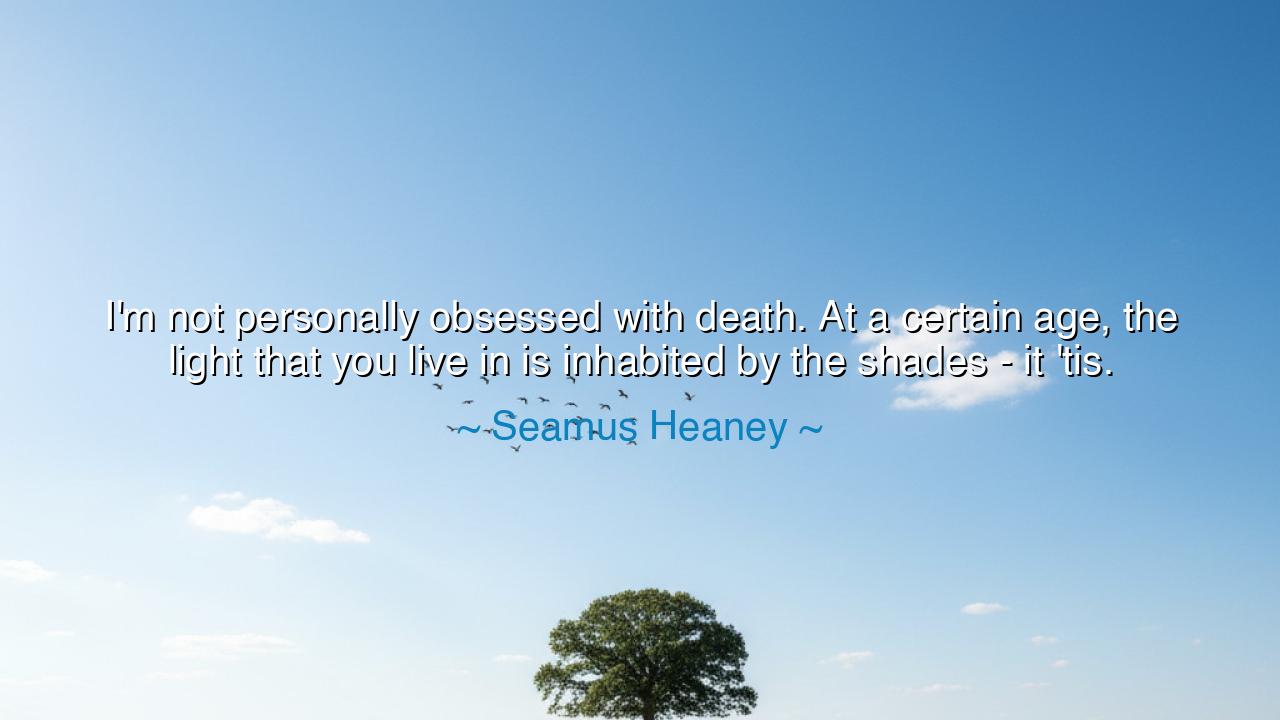
I'm not personally obsessed with death. At a certain age, the
I'm not personally obsessed with death. At a certain age, the light that you live in is inhabited by the shades - it 'tis.






In the silent depths of human existence, there is a profound truth that every soul must one day confront: the inevitable presence of death. And yet, Seamus Heaney—in his quiet, contemplative manner—speaks of death not as an obsession, but as a natural part of life’s journey. "I'm not personally obsessed with death. At a certain age, the light that you live in is inhabited by the shades—it 'tis." In these words, Heaney invites us to reflect on the inevitable fading of life, not as a looming terror, but as a shift in the way we perceive our world. It is not that we must live in constant fear of death, but that we must acknowledge its presence as a shadow in our lives—a presence that guides us to a deeper understanding of life and existence.
In the ancient world, there was a deep reverence for the cycle of life and death. The Greeks, in their philosophy, believed that the soul was eternal, yet subject to the natural cycles of existence. The Stoics, particularly, embraced the idea that death is not something to be feared but something to be accepted as an inevitable part of the order of the universe. Marcus Aurelius, in his meditations, wrote, "Death smiles at us all; all we can do is smile back." He teaches us not to obsess over death, but to live in harmony with it, understanding that it is a natural process that should neither define nor limit our lives.
The notion of shades inhabiting the light that we live in, as Heaney describes, reflects a similar understanding: that as we age, the presence of those who have gone before us—the shades of the past—become ever more palpable. Just as the ancient Romans honored their ancestors, believing their spirits lingered in the household, the shades of those who have passed serve as both reminders and guides. They do not haunt us, but rather, they inhabit the light of our daily existence, shaping the way we live and see the world. As Heaney poetically reflects, death is not an end but a presence that changes the nature of how we experience the world.
Consider the story of Socrates, whose life was a quest for knowledge, truth, and virtue. Even as he faced death with courage and acceptance, he did not allow it to define him. When faced with his own execution, he spoke to his students not of fear or sorrow, but of the eternal nature of the soul and the importance of living a virtuous life. Socrates’ words and actions remind us that, while death is inevitable, it is our response to it—our ability to live with integrity and purpose—that truly matters. Heaney’s reflection, much like Socrates’, tells us that death need not dominate our lives, but should instead be acknowledged as a natural phase, one that shapes our existence without diminishing its value.
At the heart of Heaney's quote lies the understanding that death is not something to be feared, but a transformative force. It is not the death itself that should preoccupy us, but how we choose to live with that awareness. The shades—those who have passed before us—are not gone, but live in the light of our memories, our actions, and our legacy. The ancients spoke of a person’s legacy as something that transcends the body; a good life lived with honor and integrity creates a shadow that endures long after the body has turned to dust. Heaney, in his quiet wisdom, speaks of this presence—not as a haunting, but as a guide, urging us to live well, knowing that we, too, will one day join the shades that now inhabit the light.
The lesson here is clear: death is not to be feared, but acknowledged. To live in constant dread of the end is to waste the gift of life. Heaney urges us to recognize that death is not an interruption, but an integral part of the journey. Instead of fearing it, we must live in harmony with it, allowing it to deepen our appreciation for the preciousness of life. Just as Socrates accepted his fate with grace, we too must find the strength to live fully, not in denial of death, but in acceptance of its presence, allowing it to shape our actions, our relationships, and our sense of purpose.
Practical action, then, calls upon us to live with intention, understanding that death is never far, but that it need not diminish the beauty of each moment. Take time to honor the shades of those who have gone before you, not as figures of sorrow, but as guides who have shaped the person you are today. Live fully, with integrity, and with the understanding that each action is part of a larger story, one that will continue long after we are gone. Embrace life’s impermanence, knowing that in doing so, you open yourself to a deeper, richer experience of the world around you.






AAdministratorAdministrator
Welcome, honored guests. Please leave a comment, we will respond soon